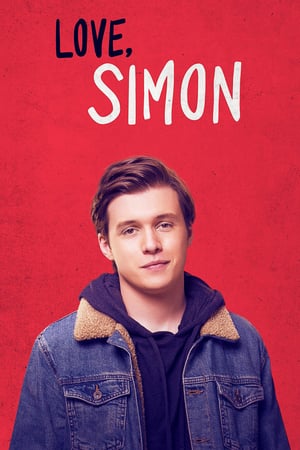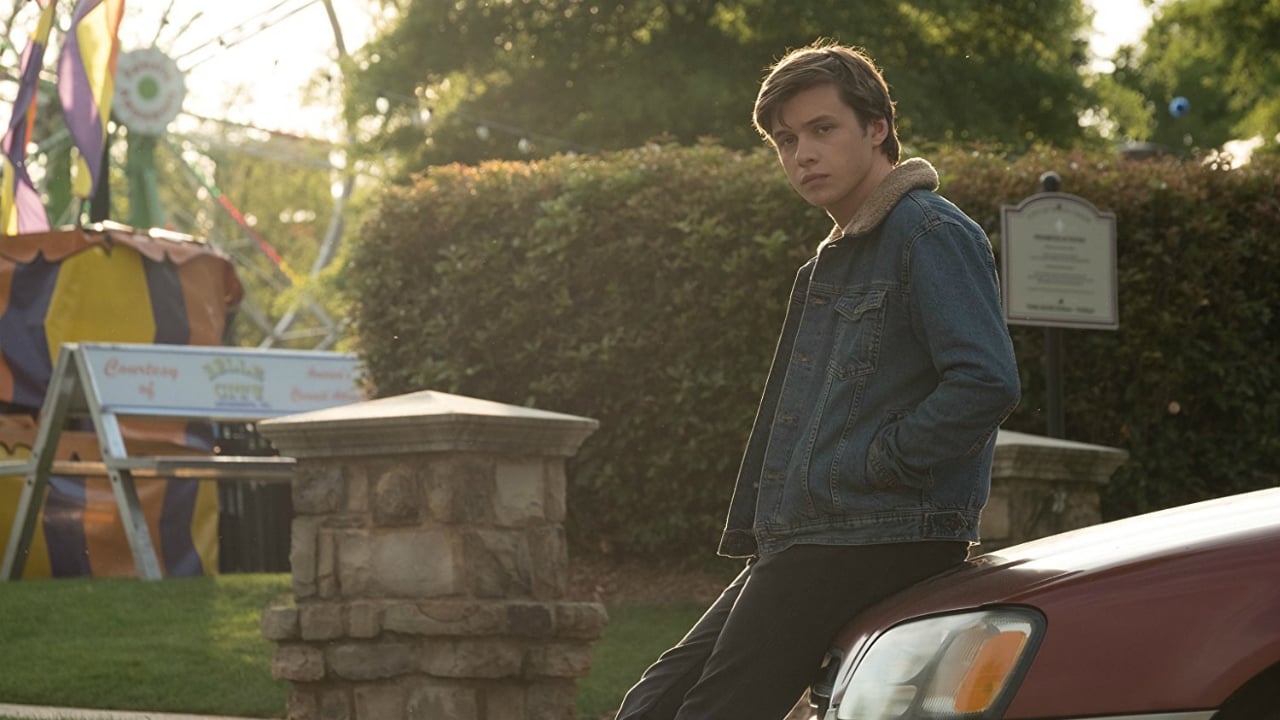
Teenager in love
The best scene in Love, Simon happens somewhere in the middle, as the closeted gay teenage title character (Nick Robinson), in a fit of frustration, supposes that he'd prefer to put off coming out until college, when he'll be in the rush of getting to redefine himself from head-to-toe anyway. This is realised in one of the film's two fantasy sequences, as Simon imagines himself the main character of a spectacular musical number inside and outside a dorm, with a chorus line of smiling men in clothes of every color of the pride flag dancing to Whitney Houston's "I Wanna Dance with Somebody (Who Loves Me)". With an almost audible wince, the monologuing Simon (there is much voiceover in the film), backs off from this flight of fancy, stating that he wants to be "maybe not that gay". And it was here that my frustrations with the film, never much in abeyance, finally shot to the forefront, making me (internally) throw my hands up in irritation as I (still internally) shrieked, "no, that is exactly the right amount of gay, and I pray to God that all of us, gay or straight or asexual, man or woman or neither, should prefer to live in a world where we got to have Whitney Houston musical numbers erupting around us at short notice. Particularly when this is the first moment of your movie that has real energy and visual vitality, you blinkered suburban nitwit".
Ah well, at least there was the musical number itself, there to suggest that director Greg Berlanti, a TV guy, could have made something lively with all the roiling interiority, if he wanted to. Instead, the film is a somewhat glassy teenage melodrama that strongly resembles the '80s work of John Hughes, both in its acutely simple, workaday style, and even more in its narrow vision of human experience. You can replace those two things with positive descriptions if you enjoy Hughes's high school films more than I do. Regardless, this is a movie whose very first gesture is to have Simon coolly assert in voiceover "I'm just like you", in one and the same moment that we see him being given a brand-new SUV for his birthday by his beaming parents (Jennifer Garner and Josh Duhamel). It takes a lot to make a character totally unsympathetic within five seconds of the movie starting, even if that's your explicit goal, but Love, Simon finds a way.
So the story, adapted by Elizabeth Berger & Isaac Aptaker from a novel by Becky Albertalli (with the vastly better title Simon vs. the Homo Sapiens Agenda): Simon hasn't told anybody that he's gay, not his parents, nor his little sister (Talitha Bateman), nor his longstanding best friends Leah (Katherine Langford) and Nick (Jorge Lendeborg, Jr.), nor his new best friend Abby (Alexandra Shipp). But he's convinced himself that he doesn't care much, because everything else in his life is pretty normal and good. This changes abruptly after the school's anonymous self-confession blog lights up with a post from Blue, who announces that he's gay. In a sudden fit of inspiration, Simon writes an e-mail to blue, as "Jacques", inaugurating an e-flirtation that would still probably not do much to budge Simon out of his complacency, except that he accidentally leaves the browser open on a school computer, leaving his personal correspondence to be perused by the awful Martin (Logan Miller), the least-untalented member of the school's hapless ensemble for a production of Cabaret. Armed with Simon's deepest secret, Martin cheerfully announces his intentions to blackmail the other boy, unless Simon will help set him up with Abby.
There's an uncharitable way to watch this, and by God I found it (Simon caves in immediately, and goes to some rather extreme ends to manipulate his closest friends, and this is all meant to somehow make him more sympathetic), but that's being at least slightly unfair. Taken on its own terms, Love, Simon is a totally harmless teen dramedy of a sort that will never be "great", but is often at least "fine", and that's really what this is. Also, it would be disingenuous not to acknowledge that the film has had a clear and pervasive positive effect on the culture writ large: social media teems with utter heartwarming stories of young and not-so-young gay and lesbian people coming out as a direct result of feeling empowered by the movie's story. That's the kind of social impact that would make a much, much worse film than this seem worthwhile. I mean, it's not even that this is bad, just kind of middling and profoundly uninvested in the potential of a visual medium.
It's also charming, in its way. Simon has been pretty thoroughly bungled as a sympathetic victim, except insofar as it's impossible not to feel sympathy for an innocent victim of blackmail, and Robinson's drowsy-eyed performance does very little to compensate for that. But the people around him certainly make for a colorful, enthusiastic friend group: Shipp, I would say, is out in front, as probably the non-Simon character who gets the most to do and the most complicated scenes to play, and Miller makes his character's petty wickedness (which the film oddly treats as a goofy annoyance, and not legally actionable harassment) emerge from pathetic self-loathing, rather than some kind of free-floating tendency towards bullying, or simmering homophobia.
The film also captures, as do the Hughes films it nakedly wants to be, something pleasantly casual about the rhythms of teenage life, with daily routines gradually shifting as they move towards some kind of small-scale punctuating moment (the film leads up to the opening night of a fair, with time marked out in only the smallest way otherwise - mostly by the evolution of the Cabaret rehearsals). Notwithstanding the overt yearning for Significance in the content - or perhaps because of it, and Berlanti's instinct to avoid making things stickily serious - the film is resolutely light in touch, asking us mostly to enjoy hanging out with Simon and company in the way that teenagers hang out, with no goals in mind and an ongoing sense of the present as the only thing there is. This doesn't add up too all that much, but for all that it feels a bit too calculated in its appeal as the First Mainstream Coming Out Movie™, it would take a bit of a crabby asshole to genuinely dislike this. I am, to be sure, a crabby asshole, but I'm trying.
Ah well, at least there was the musical number itself, there to suggest that director Greg Berlanti, a TV guy, could have made something lively with all the roiling interiority, if he wanted to. Instead, the film is a somewhat glassy teenage melodrama that strongly resembles the '80s work of John Hughes, both in its acutely simple, workaday style, and even more in its narrow vision of human experience. You can replace those two things with positive descriptions if you enjoy Hughes's high school films more than I do. Regardless, this is a movie whose very first gesture is to have Simon coolly assert in voiceover "I'm just like you", in one and the same moment that we see him being given a brand-new SUV for his birthday by his beaming parents (Jennifer Garner and Josh Duhamel). It takes a lot to make a character totally unsympathetic within five seconds of the movie starting, even if that's your explicit goal, but Love, Simon finds a way.
So the story, adapted by Elizabeth Berger & Isaac Aptaker from a novel by Becky Albertalli (with the vastly better title Simon vs. the Homo Sapiens Agenda): Simon hasn't told anybody that he's gay, not his parents, nor his little sister (Talitha Bateman), nor his longstanding best friends Leah (Katherine Langford) and Nick (Jorge Lendeborg, Jr.), nor his new best friend Abby (Alexandra Shipp). But he's convinced himself that he doesn't care much, because everything else in his life is pretty normal and good. This changes abruptly after the school's anonymous self-confession blog lights up with a post from Blue, who announces that he's gay. In a sudden fit of inspiration, Simon writes an e-mail to blue, as "Jacques", inaugurating an e-flirtation that would still probably not do much to budge Simon out of his complacency, except that he accidentally leaves the browser open on a school computer, leaving his personal correspondence to be perused by the awful Martin (Logan Miller), the least-untalented member of the school's hapless ensemble for a production of Cabaret. Armed with Simon's deepest secret, Martin cheerfully announces his intentions to blackmail the other boy, unless Simon will help set him up with Abby.
There's an uncharitable way to watch this, and by God I found it (Simon caves in immediately, and goes to some rather extreme ends to manipulate his closest friends, and this is all meant to somehow make him more sympathetic), but that's being at least slightly unfair. Taken on its own terms, Love, Simon is a totally harmless teen dramedy of a sort that will never be "great", but is often at least "fine", and that's really what this is. Also, it would be disingenuous not to acknowledge that the film has had a clear and pervasive positive effect on the culture writ large: social media teems with utter heartwarming stories of young and not-so-young gay and lesbian people coming out as a direct result of feeling empowered by the movie's story. That's the kind of social impact that would make a much, much worse film than this seem worthwhile. I mean, it's not even that this is bad, just kind of middling and profoundly uninvested in the potential of a visual medium.
It's also charming, in its way. Simon has been pretty thoroughly bungled as a sympathetic victim, except insofar as it's impossible not to feel sympathy for an innocent victim of blackmail, and Robinson's drowsy-eyed performance does very little to compensate for that. But the people around him certainly make for a colorful, enthusiastic friend group: Shipp, I would say, is out in front, as probably the non-Simon character who gets the most to do and the most complicated scenes to play, and Miller makes his character's petty wickedness (which the film oddly treats as a goofy annoyance, and not legally actionable harassment) emerge from pathetic self-loathing, rather than some kind of free-floating tendency towards bullying, or simmering homophobia.
The film also captures, as do the Hughes films it nakedly wants to be, something pleasantly casual about the rhythms of teenage life, with daily routines gradually shifting as they move towards some kind of small-scale punctuating moment (the film leads up to the opening night of a fair, with time marked out in only the smallest way otherwise - mostly by the evolution of the Cabaret rehearsals). Notwithstanding the overt yearning for Significance in the content - or perhaps because of it, and Berlanti's instinct to avoid making things stickily serious - the film is resolutely light in touch, asking us mostly to enjoy hanging out with Simon and company in the way that teenagers hang out, with no goals in mind and an ongoing sense of the present as the only thing there is. This doesn't add up too all that much, but for all that it feels a bit too calculated in its appeal as the First Mainstream Coming Out Movie™, it would take a bit of a crabby asshole to genuinely dislike this. I am, to be sure, a crabby asshole, but I'm trying.
Categories: comedies, coming-of-age, domestic dramas






